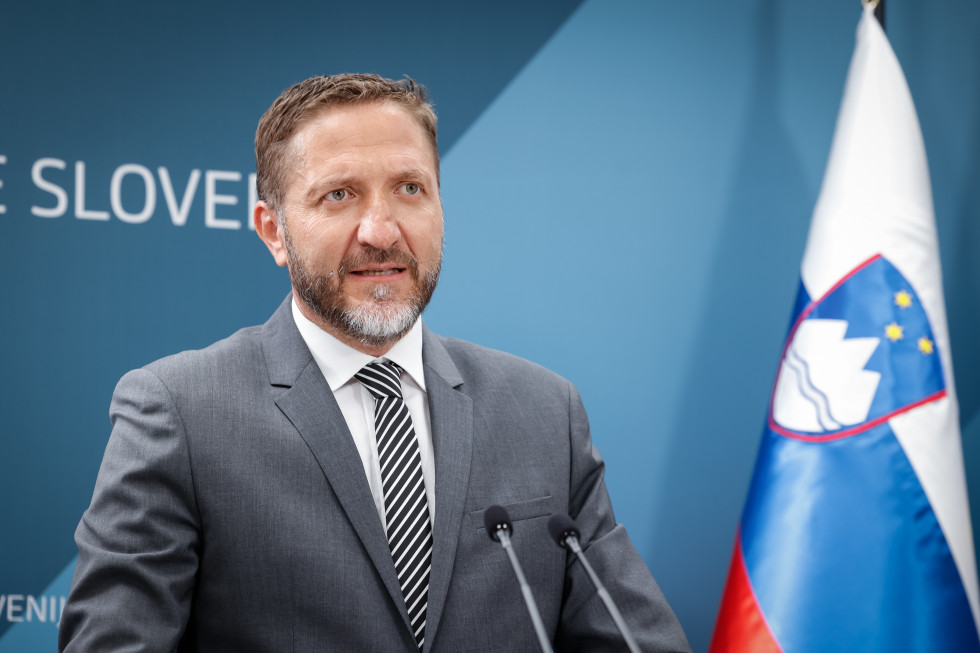10th regular government session: A lower VAT rate on certain types of energy products

Minister of Finance Klemen Boštjančič | Author STA/Nebojša Tejić
The decisions were presented at a press conference by Minister of Foreign Affairs Tanja Fajon, Minister of Finance Klemen Boštjančič and State Secretary at the Ministry of Defence Damir Črnčec.
Foreign minister Fajon: After five months of war the Ukrainians are exhausted and frightened
The foreign minister briefed the Slovenian Government on her visit to Kyiv and her meeting with her Ukrainian counterpart, Mr Kuleba. She stressed that the visit had taken place in extremely challenging security conditions and that fatigue, pain, anger and fear could be felt among the people. The Russian aggression has lasted for as long as five months, and Russian forces already control over 20% of Ukrainian territory. The informal impression, said Minister Fajon, is that Russia is preparing to annex the seized land. According to Ms Fajon, the most intensive battles underway are those for control over Black Sea ports: if any of them is lost, the entire continental part of Ukrainian territory will be connected all the way to Crimea, which would be a great strategic loss for Ukraine. She also pointed out that despite the recent signing of a grain export agreement between Ukraine and Russia, this has not yet happened, due to shelling, missile attacks and inability to secure the ships carrying the grain.
Ukraine is grateful to Slovenia for all its support and military and humanitarian assistance, said the foreign minister, and can expect Slovenia’s political assistance to continue. How Slovenia can help Ukraine was a common theme of the talks. One part of this assistance is certainly humanitarian aid – Slovenia, in cooperation with the non-governmental sector, has so far donated more than nine million euros –, but talks have also been held on the possibility of rehabilitating the wounded and on the possibility of delivering ambulances, while Ukraine has also asked for firefighting equipment and vehicles.
Even if the war is still ongoing, it is important already at this stage to help Ukraine rebuild its infrastructure and water and electricity supply. Slovenia will continue to provide assistance to Ukraine, and the details about the full aid package will be disclosed in the coming weeks, concluded the foreign minister.
Minister Boštjančič: Lower VAT will reduce bills for all
Finance minister Klemen Boštjančič said that the Government had taken a decision to reduce the value added tax on energy products for all users and that this measure would treat them all equally.
The Government proposes to reduce VAT on supplies of electricity, natural gas, district heating and firewood (wood biomass for heating). The reduced VAT rate of 9.5% is proposed for the heating season, i.e. from 1 September 2022 to 31 May 2023.
The finance minister also said that the Government was taking this measure to address the impact of energy price increases during the peak energy consumption period, i.e. during the heating season, complementing the measure of regulating the prices of electricity and natural gas. The VAT reduction proposal also includes district heating and wood biomass for heating.
Minister Boštjančič stressed that the lower value added tax will benefit all users, but most of all households. The Government’s measure also covers those who already enjoy low electricity and natural gas prices, and the savings on users’ bills could range from a few hundred to a thousand euros per year over the nine months the measure is in force.
He explained that it is not possible to reduce the VAT on heating oil, due to the relevant European directive, but that in the coming weeks, the Government will take action regarding this energy product and regarding district heating by regulating prices. "On the other hand, since the Government cannot regulate prices in the case of wood biomass for heating, it has intervened in this area by reducing VAT," concluded the finance minister.
In response to a journalist’s question, Minister Boštjančič also said that due to the reduced VAT, Slovenia would record EUR 130 million less revenue in the budget, approximately 40 million this year and 90 million next. He also announced the rebalancing of this year’s budget, which will be done as part of drafting the budgets for 2023 and 2024.
Full assessment of the fires in the Goriška Karst region is expected by mid-September
The Government took note of the first information about the fires in the Goriška Karst region and ordered the competent ministries to prepare an assessment of the total direct damage, State Secretary Črnčec said at the press conference, adding that Slovenia would also request assistance to repair the damage from the European Solidarity Fund. The funds obtained will be used to restore infrastructure damaged during the raging of the fires.
The state secretary also said that Slovenia had already received assistance from this fund four times (three times for floods and in 2014 for glaze ice) in the total amount of around EUR 48 million.
Although the interventions in the fire-damaged area have not yet been concluded and the national plan is still in force, the state secretary expressed the hope that an epilogue will occur soon so that a full assessment of the fire damage can be made. Such a full assessment is expected to be ready by mid-September.
At the end of the press conference, State Secretary Črnčec also said that by the end of September, amendments to the Protection Against Natural and Other Disasters Act would be drafted, by which the Government will also resolve the issue of rewards to volunteer firefighters and all those activated during fire-fighting. Rewards will be granted to volunteers activated pursuant to the national plan and mobilised by civil protection.

